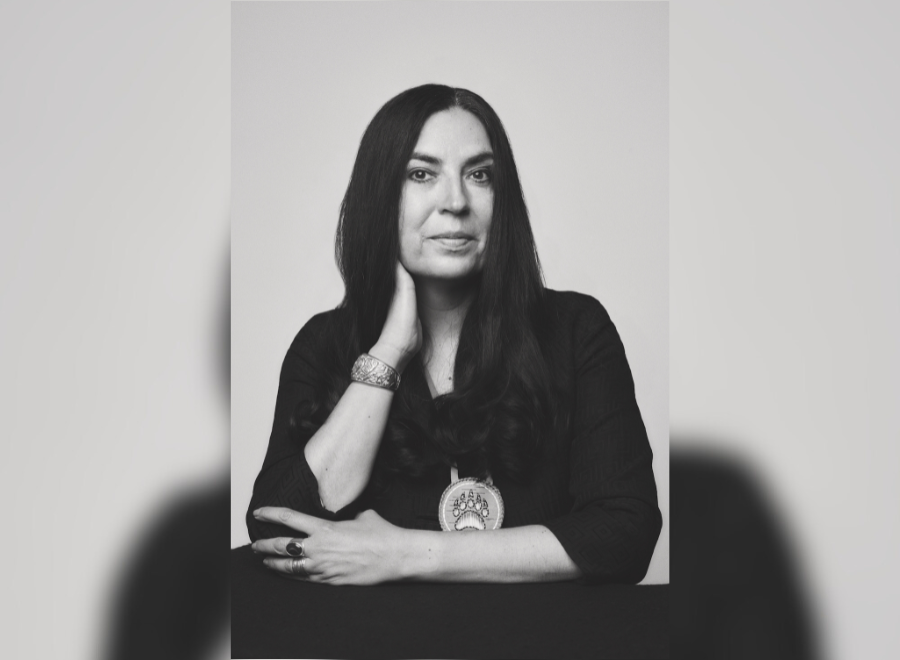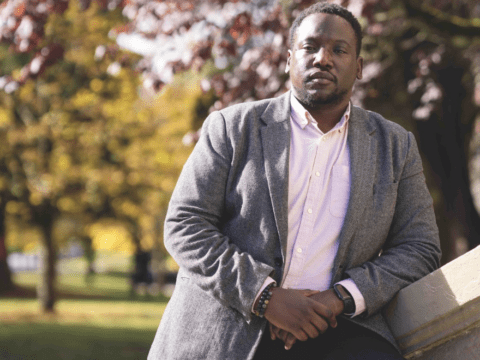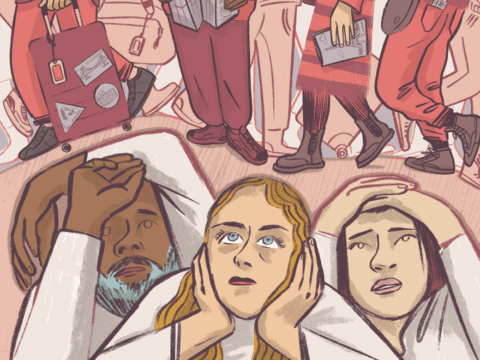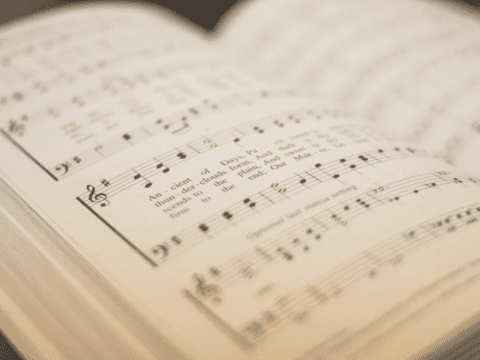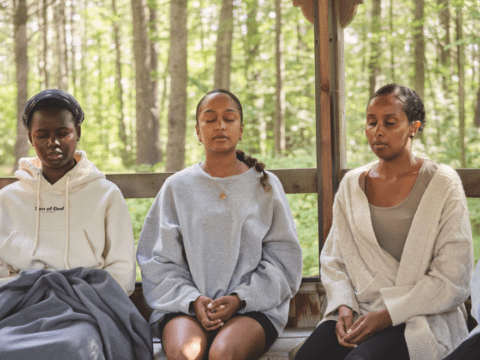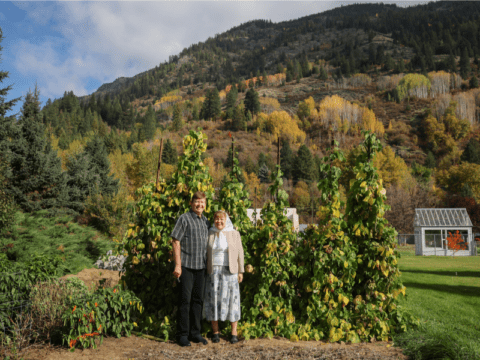CW: This story contains references to experiences at residential schools. Take care when reading.
Anishinaabe-Polish journalist and author Tanya Talaga has dedicated over 20 years to reporting on Indigenous issues, but her latest book, The Knowing, is the most personal yet. The book documents her efforts to locate the gravesite of her great-great-grandmother on her mother’s side: Annie Carpenter of Fort William First Nation in Ontario. Carpenter died at 66 in 1937 at the Mimico Asylum in Ontario. The circumstances of her life and death were unknown to her descendants.
You may unsubscribe from any of our newsletters at any time.
Combing through records of treaty payments, residential schools and government correspondence, Talaga learned about Carpenter and her children while uncovering larger truths about the colonization of Indigenous people in Canada. The narrative follows Talaga’s journey from Toronto to Tk’emlúps te Secwépemc in British Columbia, and from the Vatican where she witnesses the papal apology to Carpenter’s gravesite. The Knowing has also been adapted into a four-part docu-series on CBC Gem.
While on the road in Ontario or her book tour, Talaga spoke about her experiences to Alison Tedford Seaweed, who is a member of the Kwakiutl First Nation.
Alison Tedford Seaweed: The Knowing is a deeply personal account of your family history. How does it feel to bring such a story to readers?
Tanya Talaga: It’s not easy. You feel really vulnerable. You wonder, too, why you’re doing it sometimes. It’s hard. We are part of the story, and it’s something you can’t really escape. Every single one of our families has known or heard of someone who didn’t come home from residential schools, from Indian hospitals, from tuberculosis sanitaria. It happens to all of our families. We all have stories, and I couldn’t write this book and tell this story of what happened in Canada without looking inward and telling our side of the story too. It’s not an easy thing to do at all.
ATS: You’ve spoken about the timing of this book and your 2017 book, Seven Fallen Feathers, which is about the death of seven Indigenous high school students in Thunder Bay, Ont. What made you hold on to The Knowing and wait for the right time to tell it?
TT: I remember when the Truth and Reconciliation Commission came out with its 94 Calls to Action in 2015 and the six volumes written by the commissioners. I remember reading the fourth volume of the TRC; it’s about children who died at the residential schools. I was amazed back then that nobody really took that and went hard at it and tried to find out what was happening with the children. The TRC mentioned there were around 3,700 children who didn’t make it home, and that they knew that was not a correct number — that it was probably way too low — but the commissioners didn’t have the money or the time to continue forward with that investigation. I was always struck that no one had picked up on that, or I wasn’t seeing anybody trying to find out more information about what happened to all the children.
Fast-forward to when I was sitting with an editor from House of Anansi Press, and I was pitching two books. I mentioned to her that I wanted to write a book about the children who were dying in the waters in Thunder Bay, and that I also wanted to do a larger book on residential schools and the children who didn’t come home. And she was the one who suggested writing Seven Fallen Feathers first and then going back to write the larger story. In The Knowing, I rewrite Canadian history through a First Nations woman’s lens and add the story of my family. It’s an epic narrative. I don’t know if I’ll ever write a book like this again.
More on Broadview:
ATS: There is a lot of denialism right now about residential schools. Why is it important to bring a story like this forward at this time?
TT: I hope that The Knowing is an antidote to the denialism and is proof that this happened. [At the former Lakeshore Psychiatric Hospital] where Annie is buried, there are 32 other First Nations people. Do their families know that they’re there? I don’t think so. We started a working group with the Ontario Chief Coroner’s office, the Nishnawbe Aski Nation, Grand Council Treaty 3, Anishinabek Nation, and the Office of the Independent Special Interlocutor for Missing Children and Unmarked Graves and Burial Sites associated with Indian Residential Schools to find the families of the 32 others who are there.
This is Canada’s truth and Canada’s history. Our people went missing. We have the records. We know the truth. Kimberly Murray’s work [as the special interlocutor for missing children and unmarked graves and burial sites] is undeniable. She built off the TRC. It’s sad that some Canadians don’t feel this is accurate, that there is that denialism, but I hope that when they read her report [released in October] and when they read my book, they’ll see the truth.
ATS: What was the most challenging part of writing the book?
TT: Finding the right records was hard. But the most challenging part of the book was actually sharing it with my mother and my cousins. I gave the book out to them before it was done, and I often had to tell them information they didn’t know about.
I’m still doing that a lot of times. I’m still telling them, “Your great-grandfather, he’s actually not your great-grandfather; it’s somebody else.” That was hard. It’s hard being the one to tell others because you live with so much silence and you don’t know the answers to all these questions, and then suddenly you discover things, and they’re hard truths and you have to share them.
ATS: As First Nations people, we have such a strong oral tradition. Now we find ourselves in this place where we are seeking all of these written records to substantiate and document our history. It’s a tenuous thing: the colonial records don’t define who we are, but they also explain so much.
TT: It is maddening, especially because some of the records are wrong. I mention in the book my great-great grandfather, Samson Wemaystikosh — you’ve got seven different spellings, at least, of his last name. So when you’re hunting for records, you’re at the mercy of whoever wrote it down. And a lot of the time, the people who were writing them down, they didn’t understand what we were saying. They didn’t understand our language at all. They wrote down what they wanted to hear. That’s hard too, because then you’ve got to sift through records trying to figure out what’s right, what’s wrong.
When I was writing The Knowing, I had an army of research help — I had to — and I’m an investigative journalist.
ATS: What do you hope Indigenous readers will take away from your book?
TT: I hope Indigenous readers see parts of their own family in this book and understand that they can do what I did. It takes a long time and a lot of work. The Knowing was actually started by my uncle Hank Bowen over 80 years ago with all the [records] he was collecting [to find Annie Carpenter].
I think people will also be amazed by how much more unity there is and how much more we are all interrelated than we think we are. Right now, we have these Indian Act communities where we’re members of certain communities because that’s where our families happened to be at a certain time. But we are so much greater than that. We are people of the water, of the rivers, of the land.
What The Knowing really shows is that we moved with the water. We had all of these relations in all these different places, but the Indian Act and the reserve system have confined us and added to our own mentality of who we are. I hope people read The Knowing and realize they’ve got family and connections all over.
ATS: What do you hope will come from non-Indigenous Canadians reading The Knowing?
TT: A higher level of understanding of what the true history of this country is. We don’t have a lot of books that really delve into the history of First Nations people. I’m pretty specific with what I look at. All my writing comes from where my mother’s family is from: Fort William First Nation. I hope that non-Indigenous Canadians read this and see Canadian history in a totally different light. I hope they have an open heart and understand that this is a truth about this country that they need to know.
***
This interview has been edited for length and clarity.
Alison Tedford Seaweed is a freelance writer, business consultant, author and member of Kwakiutl First Nation.
This article first appeared in Broadview’s January/February issue with the title “The Truth in Knowing.”

